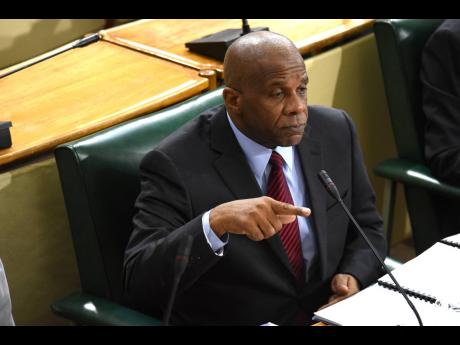Christie: I’m merely a conduit
Exec director defends IC’s Holness ruling release process as Chuck calls for inquiry
Justice Minister Delroy Chuck has called for an inquiry into the tabling of an Integrity Commission (IC) investigation report which referred Prime Minister Andrew Holness to the agency’s director of corruption prosecution for an alleged conflict of interest and the belated release of a ruling on the matter.
At the same time, IC Executive Director Greg Christie said that the agency would accept an amendment to the Integrity Commission Act allowing for the tabling of an investigation report and the ruling of the director of corruption prosecution simultaneously.
Chuck, who is a member of the IC Oversight Committee, expressed disappointment on Wednesday with how the matter was handled.
He charged that the Parliament and the country “must determine whether it can have trust in the Integrity Commission” based on responses from the agency during Wednesday’s committee meeting at Gordon House.
“Section 54(4) allowed the decision of the director of corruption prosecutions to be a part of that report. This country’s image has been damaged. The parliamentary Opposition was undermined because that ruling was not a part of that report,” Chuck said.
He said that if there is nothing prejudicial, Section 54 said the ruling could be tabled with the report.
“It is only when there is any content that is prejudicial that it should not be tabled [simultaneously]. Your ruling is that there should be no prosecution, which is not prejudicial and, therefore, Section 54(4) allows it to be tabled with the report. Am I right, Executive Director?” Chuck asked.
MISUNDERSTANDING STRUCTURE
But Christie indicated that investigation was the purview of his colleague, Kevon Stephenson, and as such, he could provide guidance.
However, Chuck charged that Christie was the head of operations.
But Christie noted that Chuck misunderstood the structure of the commission, not taking into account that he had no supervisory role or power over his respective directors, who enjoy independence and report to the board of commissioners.
Chuck reiterated his question as to whether the ruling could have been a part of the report based.
But Christie said his opinion was irrelevant, noting that he had no locus standi – right to appear before the body – in relation to the matters that Chuck raised.
“It seems that you have a fixation that these are issues that must be addressed by the executive director,” Christie said.
However, Chuck said that Christie is the face of the Integrity Commission, a claim that Christie denied.
As executive director, Christie said he was responsible for the day-to-day management of the affairs of the commission, other than those that are specifically assigned under the law to a director.
Christie said that there was a misunderstanding among members of the public that in his role as executive director, he was responsible for “all these things. I have no authority; I am merely a conduit.”
He admitted that he was aware that the director of corruption prosecution had recommended no prosecution for the prime minister on January 12.
Chuck complained that the report, which was tabled on February 14, soon after hit the international headlines.
He asked Christie whether he felt it was appropriate for him to retweet a Reuters report, having knowledge that the ruling had said that a case against the prime minister should not be pursued.
However, Christie defended the commission’s social media policy, noting that the anti-corruption body retweets the work of the commission.
“As a report comes out, we retweet on it,” Christie said.
Chuck said it was most inappropriate for him to retweet Reuters.
“The report stands on its own feet and the ruling stands on its own feet. What you are not saying is that the commission retweeted the Gleaner story on the 15th, the Jamaica Observer story, and on the same date, it retweeted the PM’s rejection of the report,” Christie said.
He said the ruling was retweeted the following day and he retweeted on his personal Twitter account the commission’s stories and the Reuters story.
Christie insisted that when reports are sent to Parliament for tabling, there will be commentary on those investigations.
“You can’t restrict people from commenting. You can’t do that,” he added.
Christie explained that when the investigation report was sent to Parliament for tabling, the commissioners were still perusing the ruling of the director of corruption prosecution, so there would be no indication of her ruling.
The investigation report has indicated that the prime minister may have influenced the awarding of government contracts to the company of a business associate.
However, Director of Corruption Prosecution Keisha Prince Kameka ruled that the matter would not be pursued.

